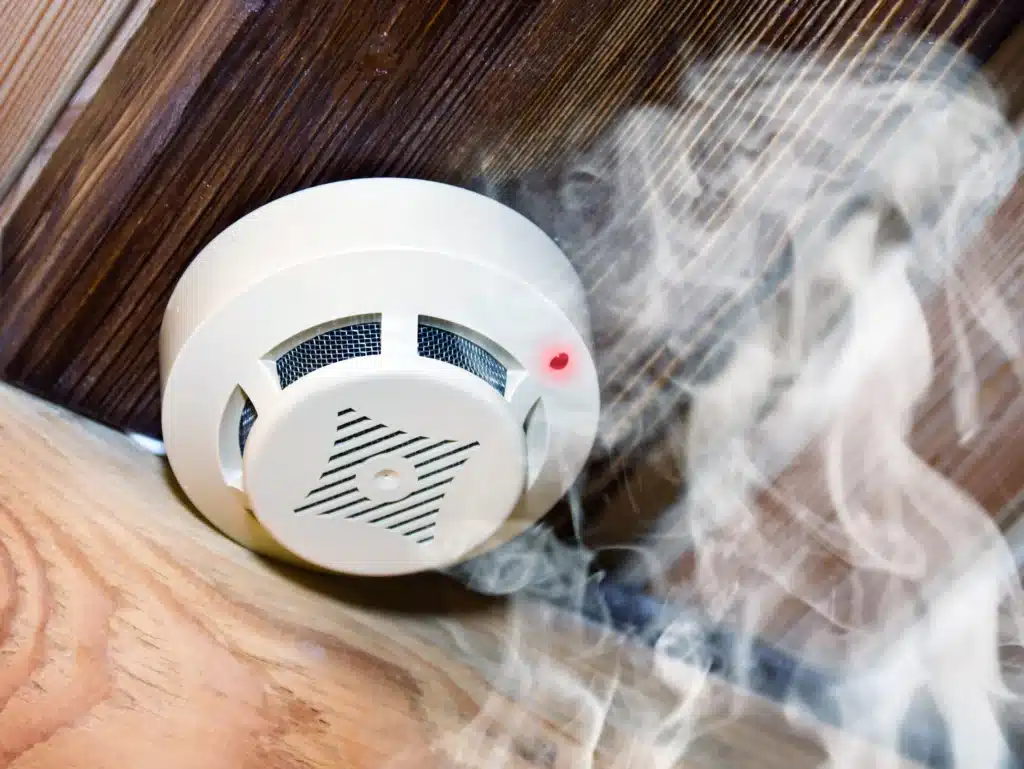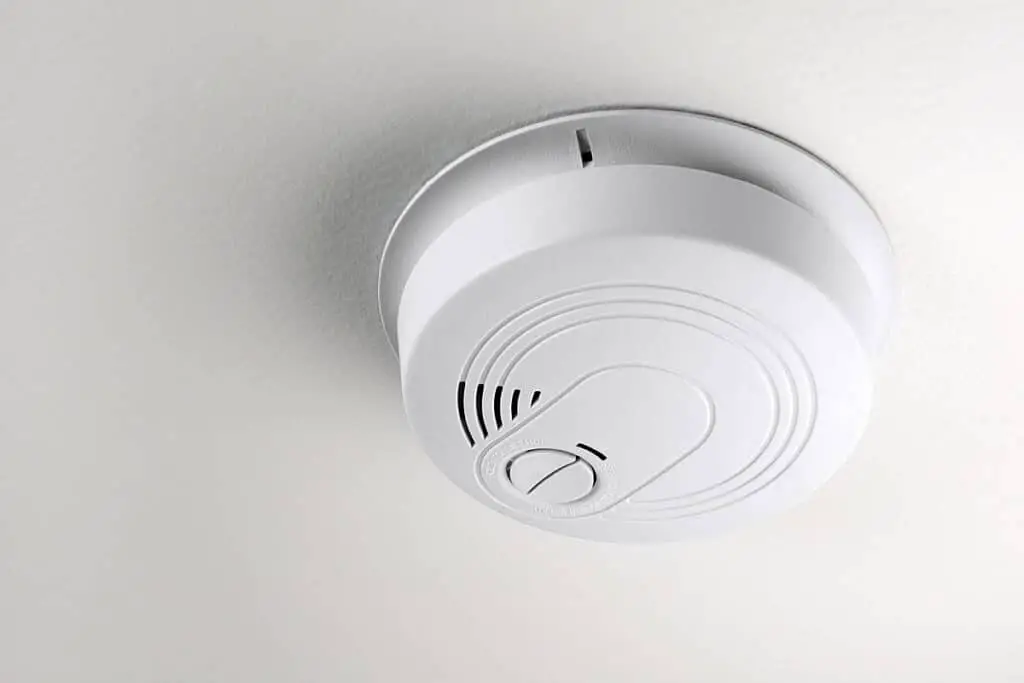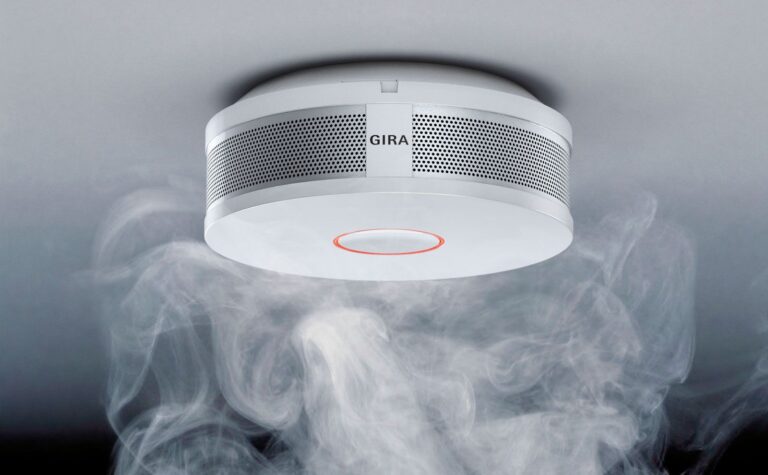Introduction
Do Hardwired Smoke Detectors Have Batteries: Hardwired smoke detectors are an essential component of any home’s safety system. These gadgets detect smoke and warn inhabitants of fire hazard. Hardwired smoke detectors are usually connected to the home’s electrical system, although many people ask if they need batteries.
The answer to this question is yes, hardwired smoke detectors do have batteries. Although they are connected to the electrical system, these devices also include a backup battery to ensure they continue to operate in the event of a power outage. This battery serves as a fail-safe, providing power to the smoke detector even when the electricity is not available.
Some hardwired smoke detectors use a different battery, but the backup is usually 9 volts. Smoke detectors need this battery checked and replaced often. Most manufacturers recommend replacing the battery once a year, however model and usage may require more frequent. Hardwired smoke detectors use the electrical system beyond the backup battery. If the house has power, the smoke detector works. Power outages and electrical issues require the backup battery even with a hardwired connection.

What battery for hardwired smoke alarm?
When it comes to hardwired smoke alarms, choosing the right battery is crucial for ensuring the safety and functionality of the alarm system. The battery serves as a backup power source in case of a power outage, allowing the smoke alarm to continue operating and providing early warning in the event of a fire. However, not all batteries are suitable for hardwired smoke alarms, and it is important to select the correct type to ensure optimal performance.
Hardwired smoke alarms often use 9-volt alkaline batteries. These long-lasting batteries are readily available and reliable for smoke alarms. Because of their high energy density, alkaline batteries can deliver reliable power for a long time. Smoke alarms must always be working to warn of fires.
Lithium batteries are another hardwired smoke alarm solution. Lithium batteries are ideal for smoke alarms due to their durability and energy density. These batteries last longer than alkaline ones, therefore they need to be replaced less often. Lithium batteries also leak less and corrode less than alkaline batteries. They outperform hardwired smoke alarms in reliability and durability.
Remember that not all hardwired smoke alarms work with lithium batteries. Some smoke alarm manufacturers suggest alkaline batteries, and using lithium batteries may void the warranty or reduce functionality. Be sure to read the manufacturer’s instructions before buying a hardwired smoke alarm battery.
What happens if you take the battery out of a hardwired smoke detector?
If you take the battery out of a hardwired smoke detector, it will still function to some extent. However, it will lose some important features and may not provide the same level of protection as it would with a battery. Hardware smoke detectors are attached to a building’s electrical system for constant power. The battery backup keeps the smoke detector working during power outages.
If you remove the battery from a hardwired smoke detector, it will still detect smoke and sound the alarm. The electrical connection powers the smoke detector. During a power outage, the smoke detector will not work without the battery backup. This implies the smoke detector won’t alert you to a fire if the power is down.
Hardwired smoke detector battery backups serve another crucial role. It powers other smoke detector features including the low battery alert and silence button. The low battery alarm alerts you when the battery needs to be replaced, keeping the smoke detector running. You can mute the alarm for a false alarm or smoke with the hush button.
These features are unavailable without the battery backup. This means you won’t get a battery warning or be able to quiet the alert. To ensure optimum operation and maximum protection, hardwired smoke detector batteries must be maintained.
How long do hard wired smoke alarm batteries last?
Home and building safety requires hardwired smoke alarms. They detect smoke and warn inhabitants of a fire, giving them time to flee and call 911. Hard-wired smoke alarms contain backup batteries to keep them working during a power outage. How long do these batteries last?
The lifespan of hard wired smoke alarm batteries can vary depending on several factors. Battery type matters. Most hard-wired smoke alarms use 9-volt or lithium batteries. Many earlier models utilize 9-volt batteries, whereas modern ones use lithium batteries. Lithium batteries tend to have a longer lifespan than 9-volt batteries, typically lasting anywhere from 5 to 10 years.
Another factor that can affect the lifespan of hard wired smoke alarm batteries is the frequency of false alarms. False alarms can drain the battery faster than normal, so it is important to address any issues that may be causing false alarms. Regular maintenance and cleaning of the smoke alarm can also help prolong the life of the battery.
In addition to the type of battery and frequency of false alarms, the age of the smoke alarm itself can also impact the lifespan of the battery. Over time, the components of the smoke alarm can wear out, including the battery. To keep hard-wired smoke alarms working, replace them every 10 years and change the battery.
What’s the difference between hardwired and battery smoke detectors?
Hardwired and battery smoke detectors are two common types of smoke detectors used in homes and buildings. While both serve the same purpose of detecting smoke and alerting occupants of a potential fire, there are some key differences between the two.
Hardwired smoke detectors connect to building wiring. An electrician installs and powers them from the building’s electrical system. If the power goes out, these detectors feature a backup battery to keep working. Hardwired smoke detectors are interconnected, so if one detects smoke, the rest will alarm. This networked function is useful in larger buildings since one detector may not inform all residents.
However, battery smoke detectors need only batteries. They can be installed anyplace in a building without electrical wiring and are easy to install. Battery smoke detectors are freestanding and do not link like hardwired ones. Wirelessly connecting battery smoke detectors lets them converse and sound an alarm.
A benefit of hardwired smoke detectors is reliability. They’re connected to the building’s electrical system, so no battery changes are needed. This powers detectors. Replace smoke detector batteries regularly. Unchanged batteries disable detectors.
Cost is another difference between hardwired and battery smoke alarms. Hardwired detectors cost more to buy and install than battery detectors. Professional installation and electrical wiring increase costs. However, homeowner-installable battery smoke detectors are cheaper.
What is the difference between a hardwired and not hardwired smoke detector?
A smoke detector is an essential safety device that detects the presence of smoke in the air and alerts people to potential fire hazards. There are two main types of smoke detectors: hardwired and not hardwired. The main difference between these two types lies in their power source and installation method.
Hardwired smoke detectors connect to building electrical. It’s installed and powered by a separate circuit or the building’s electrical system by professionals. All detectors usually warn when one detects smoke. This function notifies everyone to the risk in larger structures or multi-story houses.
Batteries power smoke alarms. Installation is simple and these detectors can be installed anywhere in the building without wiring. They are utilized in older homes and buildings without hardwired smoke detectors. Unplug smoke alarm batteries.
Battery-free hardwired smoke alarms eliminate power loss and battery replacement. Being always powered and connected to the electrical system helps them detect smoke better. Hardwired detectors require professional installation and electrical cabling, which may cost more.
Battery-powered smoke detectors are cheaper and easier to install. They can be moved when needed. For proper operation, they require regular battery replacement. Check and replace smoke detector batteries periodically.
Building electrical wiring powers hardwired smoke alarms. Electricity comes directly from the grid. Power comes from sources other than batteries. The smoke detector runs on continuous energy from wiring.
Hardwired smoke detectors have backups but don’t need batteries. Power outages and electrical system breakdowns are served by these backup batteries. Backup batteries protect the smoke detector when the power is out.
Building wiring powers hardwired smoke detectors. Although they don’t need batteries for electricity, they generally have backups.
Do hardwired smoke detectors require batteries?
Yes, hardwired smoke detectors do require batteries. While they are connected to the electrical system of a building, the batteries serve as a backup power source in case of a power outage. This ensures that the smoke detector continues to function and provide early warning in the event of a fire, even when there is no electricity.
Batteries power hardwired smoke detector alarms and monitoring systems. They often last several years before needing replacement. To keep the smoke detector working, check and change the batteries regularly.
Are batteries necessary for hardwired smoke detectors to function?
Yes, batteries are necessary for hardwired smoke detectors to function properly. Hardwired smoke detectors need backup batteries to operate during power outages. These batteries power the smoke detector when the power is out.
The backup batteries in hardwired smoke detectors are crucial because they ensure that the detectors can still detect smoke and sound an alarm even when there is no electricity. This is especially important during emergencies, such as fires, when power outages are common. Without the backup batteries, the smoke detectors would be rendered useless during these critical moments, putting lives and property at risk.
Can hardwired smoke detectors operate without batteries?
Hardwired smoke detectors are typically connected to the electrical system of a building, which serves as their primary power source. However, it is important to note that most hardwired smoke detectors also require backup batteries to ensure their functionality in case of a power outage. These backup batteries serve as a secondary power source and allow the smoke detectors to continue operating even when the electrical power is temporarily unavailable.
Hardwired smoke detectors can operate without batteries if there is a constant energy supply, but backup batteries are suggested. Because power outages can happen unexpectedly, smoke detectors without backup batteries are ineffective. Backup batteries keep smoke detectors working and protecting against fire and smoke.
Do hardwired smoke detectors have backup battery capabilities?
Hardwired smoke detectors usually have batteries. Hardwired smoke detectors are powered by a building’s electrical cabling and feature a backup battery for power outages. This 9-volt backup battery activates when the primary power supply fails.
The backup battery in hardwired smoke detectors is crucial as it provides continuous protection even when there is no electricity. This is especially important during emergencies such as fires, where power outages are common. The backup battery ensures that the smoke detector remains operational and can detect smoke or fire, alerting occupants of the potential danger.
It is important to regularly check and replace the backup battery in hardwired smoke detectors to ensure they are always ready to function in case of a power outage. Test the smoke detector periodically and replace the battery once a year or as advised by the manufacturer. By having backup battery capabilities, hardwired smoke detectors provide reliable and continuous protection against fire hazards.

Conclusion
The batteries in hardwired smoke detectors serve multiple purposes. Firstly, they provide power to the smoke detector when there is no electricity. This is crucial as fires can occur at any time, including during power outages. The battery backup ensures that the smoke detector can still detect smoke and sound the alarm, providing early warning to occupants and giving them time to evacuate safely.
Secondly, the batteries in hardwired smoke detectors act as a fail-safe mechanism. In the event of a malfunction or a problem with the electrical connection, the battery backup ensures that the smoke detector continues to function. This redundancy is essential for the reliable operation of the smoke detector, as it eliminates the risk of a complete failure due to a power or wiring issue.
Maintaining hardwired smoke detector batteries is necessary. Regular replenishment ensures they are fully charged and can supply backup power. Check and replace hardwired smoke detector batteries annually. This simple repair can boost smoke detector performance and household safety.

